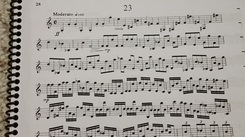
This game was first described to me by Tom Booth during my time at SMU. The goal is to gain consistency in passages that you have already learned slowly by buzzing, singing, etc. I usually use this game with excerpts, but it can be equally beneficial when applied to difficult solo passages or technique exercises.
The game is pretty simple:
Although the process seems simple, this is one way of practicing most people neglect (including myself). We often work on something, finally get it right, and then go on to practice the next difficult thing. It is good when you get it right, but then you need to reinforce the correct way of playing the passage. For example, if you messed up an excerpt 3 times before getting it correct, your ratio of correct to incorrect is 1 to 3. Even if you don't have time to get 10 correct repetitions in a row, you always want to have more correct reps than incorrect.
There are lots of articles about how many correct repetitions it takes to "erase" a mistake, some saying 8 times, some saying 20 or more. Either way you look at it, you want to minimize the incorrect repetitions and maximize the correct ones. This game is most useful once you have learned the passage well, otherwise you are bound to play the passage incorrectly multiple times in a row. Even though there is no way to recreate the stress of an audition, I find that I experience similar feelings if I am playing this game and have moved 9 of the 10 coins to the new pile. There is some extra pressure just knowing that if this last run is not clean, I have to start all over as square one.
Try starting with something you are very comfortable with and see how you do!
The game is pretty simple:
- Get a stack of 10 coins (or buttons, pencils, or whatever) and pick an excerpt or passage
- Play the excerpt and record it
- Listen back, and if you hear no mistakes, remove one coin from the pile and start a new pile. If you do hear mistakes, use your big bag of practice techniques to make it better, then record it again until it is correct.
- f you make a mistake (on any of the takes), put all the coins back in the first pile and start over.
- Repeat this process, and you are finished when all the coins are moved from the old pile to the new. This means you have played the passage correctly 10 times in a row!
Although the process seems simple, this is one way of practicing most people neglect (including myself). We often work on something, finally get it right, and then go on to practice the next difficult thing. It is good when you get it right, but then you need to reinforce the correct way of playing the passage. For example, if you messed up an excerpt 3 times before getting it correct, your ratio of correct to incorrect is 1 to 3. Even if you don't have time to get 10 correct repetitions in a row, you always want to have more correct reps than incorrect.
There are lots of articles about how many correct repetitions it takes to "erase" a mistake, some saying 8 times, some saying 20 or more. Either way you look at it, you want to minimize the incorrect repetitions and maximize the correct ones. This game is most useful once you have learned the passage well, otherwise you are bound to play the passage incorrectly multiple times in a row. Even though there is no way to recreate the stress of an audition, I find that I experience similar feelings if I am playing this game and have moved 9 of the 10 coins to the new pile. There is some extra pressure just knowing that if this last run is not clean, I have to start all over as square one.
Try starting with something you are very comfortable with and see how you do!








 RSS Feed
RSS Feed
